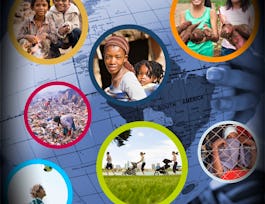This course will provide you with an overview of the most important health challenges facing the world today. You will gain insight into how challenges have changed over time, we will discuss the likely determinants of such changes and examine future projections. Successful international strategies and programs promoting human health will be highlighted and global health governance structures will be mapped and the role of the key actors explored.


An Introduction to Global Health
Taught in English
Some content may not be translated
31,366 already enrolled
(812 reviews)
Skills you'll gain
Details to know

Add to your LinkedIn profile
12 quizzes
See how employees at top companies are mastering in-demand skills


Earn a career certificate
Add this credential to your LinkedIn profile, resume, or CV
Share it on social media and in your performance review

There are 7 modules in this course
Welcome to the first module of this global health course. In the first lesson we will introduce you to the overall concepts and definitions of global health and examine the question "What are the biggest global health challenges?". You'll get to hear some answers from fellow learners from around the world, and also have an opportunity to join the conversation here in the course discussion forums. We also have an interview with Professor Susan Whyte about the impact of health policy on a population's health. The second lesson deals with the central tools needed to measure global health burden. Together these two lessons will form the basis on which all the other topical modules are built. Enjoy!
What's included
8 videos3 readings1 quiz1 discussion prompt
The second module of this course is focussed on infectious diseases. Lesson 3 will introduce you to the concept of infectious diseases and their relation to poverty and development, and lesson 4 will go through three prominent examples of infectious diseases that are still unfinished agendas in large parts of the world.
What's included
5 videos2 readings2 quizzes
In the third module we'll have a closer look at non-communicable diseases, in short NCDs, and examine the forces that are behind the global epidemic rise of NCDs such as diabetes. The module also includes a lesson about mental health and injuries - two major global health challenges that are often ignored when dealing with NCDs.
What's included
7 videos2 readings3 quizzes
This fourth module deals with maternal and child health. The first focus will be on the important, and at times controversial, topic of sexual and reproductive health and rights, often shortened to SRHR. This is followed by a short lesson focussed on child health.
What's included
6 videos3 readings1 quiz4 discussion prompts
In the fifth module we are looking at some great global crises that profoundly impact the health of populations, namely environment, climate change, and migration. We will examine the health acpect of these mega trends - how are they influencing and challenging policy, health systems, and the health of individuals in both low and high income countries?
What's included
6 videos2 readings1 quiz
Access to nutrituous food and clean water are fundamental to health and wellbeing. In the sixth module we are focussing on the role of nutrition and water, with some extra attention to the important role of sanitation and hygiene and their relation to human development.
What's included
4 videos2 readings2 quizzes
In this final module of the course we will go full circle, with lessons about the role of health systems and the impact of policy. The last lesson of the course will focus on global health governance and the health aspects of the UN Sustainable Development Goals.
What's included
7 videos5 readings2 quizzes
Instructor

Offered by
Recommended if you're interested in Public Health

University of Geneva

University of Minnesota

Yale University

University of Illinois at Urbana-Champaign
Why people choose Coursera for their career




Learner reviews
Showing 3 of 812
812 reviews
- 5 stars
80.91%
- 4 stars
16.87%
- 3 stars
1.72%
- 2 stars
0.12%
- 1 star
0.36%
New to Public Health? Start here.

Open new doors with Coursera Plus
Unlimited access to 7,000+ world-class courses, hands-on projects, and job-ready certificate programs - all included in your subscription
Advance your career with an online degree
Earn a degree from world-class universities - 100% online
Join over 3,400 global companies that choose Coursera for Business
Upskill your employees to excel in the digital economy
Frequently asked questions
Access to lectures and assignments depends on your type of enrollment. If you take a course in audit mode, you will be able to see most course materials for free. To access graded assignments and to earn a Certificate, you will need to purchase the Certificate experience, during or after your audit. If you don't see the audit option:
The course may not offer an audit option. You can try a Free Trial instead, or apply for Financial Aid.
The course may offer 'Full Course, No Certificate' instead. This option lets you see all course materials, submit required assessments, and get a final grade. This also means that you will not be able to purchase a Certificate experience.
When you purchase a Certificate you get access to all course materials, including graded assignments. Upon completing the course, your electronic Certificate will be added to your Accomplishments page - from there, you can print your Certificate or add it to your LinkedIn profile. If you only want to read and view the course content, you can audit the course for free.
You will be eligible for a full refund until two weeks after your payment date, or (for courses that have just launched) until two weeks after the first session of the course begins, whichever is later. You cannot receive a refund once you’ve earned a Course Certificate, even if you complete the course within the two-week refund period. See our full refund policy.


